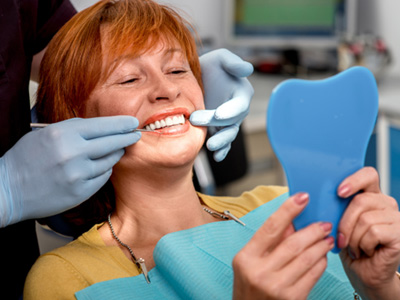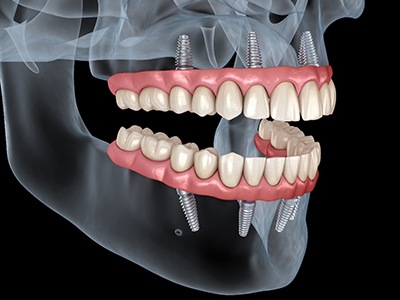Dentures – Temple, TX
A Traditional Way to Recover Your Smile
Despite modern advances in oral care, tooth loss is still a common issue. As many as 120 million Americans today have lost at least one of their permanent teeth. For this and other reasons, we at Dr. Fossum’s office provide quality dentures in the Temple area. These traditional tooth replacements can bring back your whole grin, boosting its health in the process. Read on to learn more about them, or book a consultation with us soon!
Why Choose Richard Fossum, DDS for Dentures?
- Two Dentists with Far-Reaching Skill Sets
- Customized Treatment Results
- A Dental Team That Puts Patients First
Who is a Good Candidate for Dentures?

It doesn’t take much to qualify for dentures, as most healthy adults with missing teeth can get them. That said, not every patient who’s suffered tooth loss is well-suited for the treatment. Someone may get better results with a different restoration if they still have teeth along an arch. Meanwhile, another person may have weak gums or jaws that can’t support a denture.
Given these facts, please consult our dentists before committing to dentures. They’ll give you a close oral exam to see if the restorations suit you. From there, they can draft a custom treatment plan tailored to your smile and its unique needs.
Types of Dentures

Our office may suggest one of three different dentures after your consultation. These three types are:
Partial Dentures

Partial dentures (per their name) only replace a few teeth. Made of acrylic and metal frameworks, they rest on your gums and hold artificial teeth that blend with your smile. Each one also uses suction force or clasps to stay secure in your mouth, providing a lifelike smile as a result.
Full Dentures

Unlike a partial kind, a full denture replaces an entire arch at once. That means it only uses suction force (without clasps) to remain secure and doesn’t alter your remaining teeth. However, the device still uses the same basic materials as a normal partial denture. Its base relies on gum-colored acrylic, while its artificial teeth are made from porcelain or ceramic.
Implant Dentures

If you want permanent or lasting results, you may want to try implant dentures. These kinds rely on dental implants – metal posts that slowly fuse with your jaw’s bone tissue. By doing so, any given implant denture should remain secure over time; it won’t slip or fall like others can. The final restoration will also keep your jawbone strong and prevent facial collapse.
The Benefits of Dentures

Teeth are crucial to daily life, so losing them can make even simple tasks daunting. That said, you can trust dentures to help you overcome the challenges of tooth loss. With these prosthetics from our own Dr. Fossum, you can fill your smile's gaps and make everyday living easy again. We'll even tell you about the specific benefits of dentures in detail. To that end, just keep reading or call our office soon.
Psychological Benefits

Since tooth loss worsens appearance, it tends to harm your mental health. Knowing you have major smile gaps can lower your self-esteem, cause depression, and more. The good news is dentures prevent (and treat) such moods by restoring your grin. By filling the gaps between any remaining teeth, they bolster your confidence and help you feel self-assured. The prosthetics will also keep you from worrying about your ability to speak, eat, etc.
Clearer Enunciation

Losing teeth makes talking hard, as you need them to enunciate words. Just missing a few can result in slurred speech, a severe lisp, or worse, ruining conversations. Still, dentures help you avoid such things by replacing your lost teeth. That means they support your tongue enough to let you form words, ensuring you can speak properly. You simply need to practice with them first, as it takes time to talk clearly with dentures.
Improves Nutrition

Long-term tooth loss often results in a poor diet. Since the condition keeps you from chewing tough-but-healthy foods, it greatly restricts your meal choices. However, dentures would solve this issue by providing strong and sturdy substitute teeth. These prosthetics let you chew tough foods more effectively, so they’d expand your range of potential meals. That effect would lead to a higher level of nutritional health over time.
Preserves Oral Health

Oral health suffers when you go without teeth, as smile gaps make your smile tilt, house harmful bacteria, and erode your jawbone. Such spaces even put you at risk of further tooth loss. However, dentures can protect oral health by filling those nasty smile gaps. Without those empty areas in your mouth, your nearby teeth won’t tilt, and bad microbes won’t gather. Using dentures would also slow the rate at which your jawbone erodes.
Expands Opportunities

Good first impressions depend on a pretty smile, so lacking teeth makes relationships tricky. A grin with too many gaps can make you miss out on friendships, romances, etc. Of course, today’s dentures are natural and lifelike enough to make your grin gorgeous. They’d restore your ability to form good impressions, expanding your range of social opportunities. You’d then see many long-term benefits with your friends, family, colleagues, and potential romantic partners.
Dentures Aftercare

While dentures aren’t “natural” parts of your smile, they still require daily care and maintenance. These prosthetic teeth will stop working if they’re not looked after, putting your treatment results at risk. Thankfully enough, we at Dr. Fossum’s office have great tips on caring for dentures. Using them should keep your restored grin stable, ensuring it lasts for many years. To learn about the tricks in detail, just keep reading or call us over the phone.
Removeable Dentures

Remove After Eating
You should always remove and rinse your dentures after meals. Food debris inevitably sticks to them, so “leaving them in” lets harmful plaque gather in your mouth. Meanwhile, a quick remove-and-rinse eliminates the debris and reduces your risk of gum disease.
With all that said, don’t use hot water for the rinses. Its intense heat would warp your denture’s material, ruining its ability to fit well. You’d then need to get a replacement prosthetic.
Clean Your Restoration
Aside from post-meal rinses, dentures also need once-daily cleanings. These sessions get rid of bacteria and plaque that a rinse might miss.
Your average denture cleaning is simple enough. In general, you only need to remove your device from your mouth and clean it with a toothbrush. Just remember to use hand soap instead of “normal” toothpaste; the latter can erode dentures. Also, soak the dentures in a cleaning solution (after you finish brushing) if there’s time. You can then rinse your dentures off and put them back in your mouth.
Keep Your Dentures Safe
Today’s dentures are pretty durable, but they’re not unbreakable. You’ll need to ensure your prosthetics’ safety when you aren’t using them.
You can take several steps to protect your dentures. For example, you might place a towel in your sink while cleaning them; it’d act as a cushion against falls. You also have the option of placing your dentures in a secure case. With this (or similar) storage, kids and pets won’t break your prosthetics.
Remove Dentures When You Sleep
It’s best to remove your dentures when you sleep at night. In fact, you should soak them in a disinfecting solution overnight if possible.
Constantly using dentures isn’t good for your body. When you wear them too much, they restrict your gums’ circulation and irritate your mouth tissues. Constant use also elevates your mouth’s plaque levels, putting you at greater risk of gum disease. Sleeping with dentures is even known to cause pneumonia.
Notice Changes
As best you can, monitor your dentures and your mouth for changes. Suddenly-occurring symptoms may point to a problem only your dentist can fix.
It’s especially crucial that you take damaged dentures to your dentist. While trying to repair them yourself can sound tempting, doing so would just worsen your situation. In contrast, a qualified dentist has the proper training and resources.
All-on-4 Dentures

All-on-4 dentures can’t be removed, so they have different aftercare methods. The most common ones are:
- Brushing Twice Daily – Brush your all-on-4 dentures twice daily with a soft-bristled toothbrush. (In fact, try using a sulcus brush; it’d clean between the restorations and your gums.)
- Flossing Once Daily – At least once a day, floss between your dentures’ teeth. You can even use alternative flossing tools like threaders or water flossers.
- Regular Mouth Rinses – By rinsing your mouth once daily, you can help prevent tartar from building up on your dentures.
